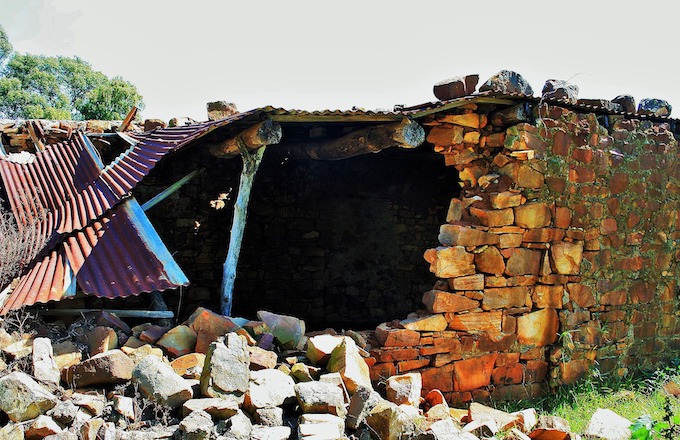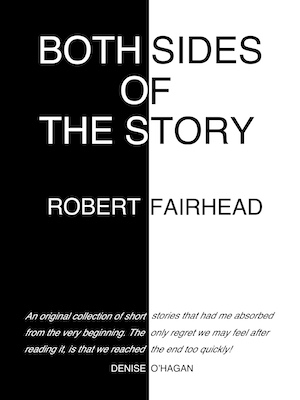- 1
- 2
Football
How many lifetimes since he had last seen a game of football, a proper match? Before the war, Tibor had watched his local team play every weekend. Now the home ground was a graveyard, and his village an enclave surrounded by enemy forces. His mother had smuggled a letter to him with the news they had shot and buried his father at the old ground. But since then, he had heard nothing from his mother. Tibor lowered the binoculars and brushed a calloused hand across his eyes. It was not wise to think of home.
An argument had broken out among his men over a disputed goal. Milo had the goalie by the throat and looked ready to strangle him. Tibor stood and called out, "Is it not enough our enemies try to kill us? Should we be helping them, too?" Milo released the goalie. He and the other men stared sheepishly at the ground for a few moments, before resuming their game. "How like children men are," Tibor muttered to himself and leaned against the barn.
As a child, Tibor had dreamed of playing football for his local team. He and the other boys in his village had practised in the streets every day after school, pretending to be the famous footballers whose photos they cut from newspapers and stuck on their bedroom walls.
Back then, it hadn't mattered what side of the river you came from, the religion you followed, or the colour of your eyes. If you could play football, you were a teammate, an equal. Back then, the only enemies were girls, taunting the boys playing in the streets from the safety of upstairs windows.
Tibor sighed and looked through his binoculars at the hills again. He had spent too much time reminiscing lately. It was dangerous to live in the past; it caused wars, like this one, dividing family and friends. Tibor's street team was the best in the village until the past caught up with them. It was a small incident, a disagreement over the price of vegetables between Tibor's father and another father from the other side of the river.
That night, Tibor's father had dragged him into the woodshed and brandishing his belt, he had forbidden Tibor from playing football with boys from the other side of the bridge. "Those people," his wild-eyed father had shouted, spitting on the woodpile, "are descended from dogs and sows. They are devils disguised as humans. Have you not heard how they feast on babies stolen from our side of the village?"
Tibor had grown up knowing the terrifying tales, but he hadn't believed them. He had played with these boys. They were not half-dog, half-pig, they were boys, boys who loved football, like him. Despite this, Tibor obeyed his father and never again played football with boys from the other side of the river.
As they got older, the gulf between Tibor and his former teammates grew wider. They shared no words of greeting when their paths crossed in the streets and markets, only disdainful glances. Sometimes there were fights. Now there was war.
Tibor looked over to his men. Two had dropped out of the game and were sitting on a broken sofa, smoking. The others were shuffling after the ball, their enthusiasm for the game waning like their energy. Even Milo could only manage a tame trot when presented with a vacant goalmouth. Tibor waited for him to score the goal and then he walked back to his men.
LOVE WRITING FICTION?
Tall And True is an online showcase and forum for writers, readers and publishers.
"Well, Milo, after the war, you have a bright future as a footballer, yes?" Milo and the men laughed. Tibor smiled. He had been right to give them a break. "Do you still wish to carry this football, so when you are famous, you can say, this is the football I scored many goals with during the war?"
Milo laughed again and wiped the sweat from his brow. "No thank you, Tibor. We win the war first, then I think of football." He drew a knife from his belt and drove it into the football. Bile burned Tibor's throat as he watched Milo squeeze the air from the ball with the same boyish grin as he had worn last week, squeezing the life from the old farmer.
"Come," said Tibor, swallowing the memory and turning his back on Milo and the farmhouse, "now we blow up the barn."
© 1994, 2019 Robert Fairhead
Robert is a writer and editor at Tall And True and blogs on his eponymous website, RobertFairhead.com. He also writes and narrates episodes for the Tall And True Short Reads storytelling podcast, featuring his short stories, blog posts and other writing from Tall And True.
Robert's book reviews and other writing have appeared in print and online media. In 2020, he published his début collection of short stories, Both Sides of the Story. In 2021, Robert published his first twelve short stories for the Furious Fiction writing competition, Twelve Furious Months, and in 2022, his second collection of Furious Fictions, Twelve More Furious Months. And in 2023, he published an anthology of his microfiction, Tall And True Microfiction.
Besides writing, Robert's favourite pastimes include reading, watching Aussie Rules football with his son and walking his dog.
He has also enjoyed a one-night stand as a stand-up comic.
Footnote: As I blogged on Tall And True in November 2019, I started working on Both Sides of the Story in February 1994. It was my third submission to the then annual Ian St James Awards, at the time the UK's biggest fiction prize for unpublished writers.
The idea for the story came to me while working out in a gym. The news at the time was full of items about people for whom the public (including me) had little sympathy. Phil Collins was singing his Both Sides song on MTV in the gym, and the music video set me thinking: Could I show both sides of the news in a short story?
So I started writing Both Sides of the Story, as a five-part short story. Westminster, Bosnia, A Council Flat, and The Gym are four standalone vignettes. And Bad News is the fifth and final part, which links and resolves the story.
Please note, my intention in writing this short story twenty-five years ago was not to be an apologist for my characters or their actions. Then, as now, my goal was to follow Phil Collins' lead and try to imagine both sides of the story.
With thanks to Bluesnap for the image of the ruined building from Pixabay.
- 1
- 2


 Browse & Buy on Amazon.com.au
Browse & Buy on Amazon.com.au

